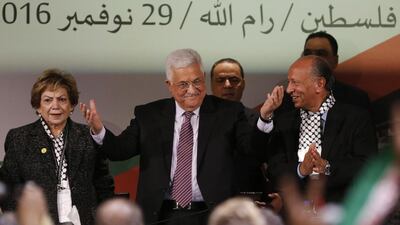Has Fatah reached its nadir? For many Palestinians, the answer is yes. Take a satirical photograph that was doing the rounds on Palestinian social media last week. The photo shows the Fatah central committee members gathered, presumably for a photo opportunity after the Palestinian political party’s recent conference in November. All of the committee members in the picture wear the same Photoshopped face: that of Mahmoud Abbas, Palestinian Authority president and Fatah chairman.
Far from stepping back from leadership – as many in Palestine and abroad have urged him to do – the ageing leader emerged from the conference with far-reaching power.
Before the conference, Mr Abbas set the tone for what was to come and barred party members who have questioned his consolidation of authority. The power grab continued at the conference as Mr Abbas relegated some of Fatah’s founding members to advisory roles and filled the new central committee with loyal comrades.
Mr Abbas will now embark on his 13th year in office (he was elected to serve a four-year term in 2005). Despite a groundswell of public opinion in support of reforming the Palestinian Legislative Council (PLC) – the only political body representing the interests of all Palestinians across the world – there is no indication of change on the horizon.
The PLC hasn’t met in nine years, its mandate expired six years ago and it has more or less been rendered useless, having failed to pass any law in the same amount of time. The reason is simple: if the PLC was given the authority it was mandated, it could act as a counter weight to Mr Abbas’s unchallenged rule. This doesn’t bode well for efforts to end the occupation.
According to a poll carried out by the Palestinian Centre for Policy and Survey Research following the Fatah conference, a majority of Palestinians have grown weary of Mr Abbas’s leadership and the deadlock in negotiations with Israel.
Unsurprisingly, many residents of Gaza – under Hamas control – called for Mr Abbas’s resignation, while the majority of those polled were unhappy with Fatah’s decision to re-elect Mr Abbas.
The poll found a sharp increase in the percentage of Palestinians who believe the two-state solution is dead. Some 65 per cent of Palestinians said it was no longer viable, up from 56 per cent three months earlier. Only 31 per cent of Palestinians said the two-state solution was still viable, and 62 per cent believe the PLO should abandon the Oslo agreement altogether.
For Israel, the Oslo agreement is critical to its global public relations strategy. Tel Aviv pays lip service to the two-state solution to avoid total isolation on the international stage. The two-state narrative has allowed Israel to entrench its control over Palestinian land while appearing as a “partner for peace” in the eyes of the world. But this facade is slowly falling apart.
With Donald Trump’s appointment of David Friedman as the American ambassador to Israel, prospects for peace and the completion of the Oslo process are dim. Mr Friedman is a hardline supporter of Israel’s settlement project in the West Bank and has said he will work to move the American embassy from Tel Aviv to Jerusalem.
While this development will please Israeli prime minister Benjamin Netanyahu and his settler supporters, it will make any attempt at peace in the next four years highly unlikely. For Palestinians who oppose Oslo, Mr Friedman could be an unlikely ally who has the power to dismantle the agreement by empowering Israel to annex and expand settlements. If Oslo is a roadblock, Mr Friedman might be the right person to remove it.
However, Mr Abbas is integral to Israeli and American plans for the next stage of the conflict. Both parties understand that he will allow for the continued colonisation of the West Bank and physical separation of the Gaza Strip. Together they have trained Mr Abbas’s security forces to crush any and all opposition to his rule and destroy any civil society movement that directly challenges the occupation in a non-violent manner.
With American and Israeli support, Mr Abbas can rule with no challenge. This is also why, following the conference, the Israeli press decided in their mind through a series of interviews and reports that Jibril Rajoub, the former chairman of the Palestinian Football Association and long-time ally of Mr Abbas, was going to be his successor.
Given Mr Rajoub’s history of cooperation with Israeli authorities in the West Bank, this was hardly a surprising decision. According to PCPSR polling data, Marwan Barghouti, the popular political figure in an Israeli prison, was the top leadership choice for Palestinians with 36 per cent support.
Hamas politician Ismail Haniyeh had 20 per cent, while Mohammed Dahlan, who lives in exile in the UAE, only garnered 4 per cent of the vote. Mr Rajoub received no support. In the West Bank, 59 per cent of Palestinians want Mr Abbas to resign, while in Gaza that number stands at 72 per cent.
The polling results demonstrate Palestinians’ genuine fatigue with the current situation, so the question is: how long before patience runs out? Based on Mr Friedman’s statements, the United States is set to embolden Israel when the new administration comes to power.
Has Mr Abbas (and his supporters) taken all the steps necessary to ensure he remains unchallenged, or will 2017 be the year Palestine reaches its boiling point?
jdana@thenational.ae
On Twitter: @ibnezra

